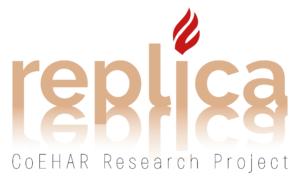CoEHAR Director Giovanni Li Volti and the co-project leader of the Replica project Massimo Caruso have been invited to be part of the 5th Scientific Summit on Harm Reduction in Athens to deliver a presentation on the latest results obtained by the Replica project and their implication for public health.
The 5th Scientific Summit on Tobacco Harm Reduction, organized by SCOHRE, the International Association on Smoking Control & Harm Reduction, opened in Athens yesterday with attendance―physical and virtual―of top researchers, clinicians, and scientists from 41 different countries.
A unique occasion to promote science at all levels and to present the findings of the research activity at an international level.
To represent the CoEHAR and one of its most successful project, the Director of the Center of Excellence for the acceleration of Harm Reduction Giovanni Li Volti and the co-project leader of the Replica project, Massimo Caruso.
To inaugurate the two-days-event, prof. Li Volti was invited to join a dedicate panel on “Scientific integrity and why it matters for public health” to present the latest findings obtained by the research team.
In front of an international audience of experts and journalists, the director explained why it is fundamental to assess the validity of the research findings: “In 2016, the journal Nature conducted a survey among 1500 scientists and 67% of the respondents reported that they have failed to reproduce the results of at least one of their peers studies. It also underlined that 50% of these scientists have failed to reproduce one of their own experiments. What is the cause of this replication crisis? Let’s start saying that no science is a perfect science.

[..] As you know, in the market diversification of alternative products there is an urgent need to investigate the safety of reduced risk product. If you search the literature you will see contrasting data and conflicting views. It is very important to produce results that are reliable: wrong findings can cause harm to individuals and above all may erode public trust. Media play a very important role in understanding how to deliver a correct message on these topic“.
One of the goal of the Replica project was to replicate the findings of the most important international studies in the electronic cigarette field: “In order to produce reliable data, it is important to assess the validity of the findings. One of the method is to replicate them, as we did in the Replica project. In order to do that, all the independent laboratories part of the Replica network have to work with the same tools, the same cell type, the same lot of cell culture”.
In conclusion, Li Volti urges the audience to continue future researches to better understand the potential of low risk products and to obtain better results.
On Thursday 22, the co-project leader of Replica, Massimo Caruso, attended the “Toxicology and aerosol chemistry” panel with the presentation “Comparative assessment of electronic nicotine delivery systems aerosol and cigarette smoke on endothelial cell migration: the Replica project“.

The CoEHAR participation was largely successful and attendees were interested in hearing the latest Replica findings. Interviewed after the panel, prof. Massimo Caruso commented: ” After 3 years of Replica, we obtained several positive results thanks to the methodologies and the innovative tools used. One of the main goal of the project was to create an independent network of laboratories: now, that network is proving to conduct research activity on its own. The meeting in Athens was an occasion to develop new collaborations with international centers all around the world”.
“CoEHAR researchers plays a central role in the field of international harm reduction research: a source of pride for all of us” stated Riccardo Polosa, founder of the CoEHAR “The 2023 international calendar of our events is already full. Our greatest achievement is to correctly communicate and spread the scientific knowledge“.
To receive more information, please visit the following link


